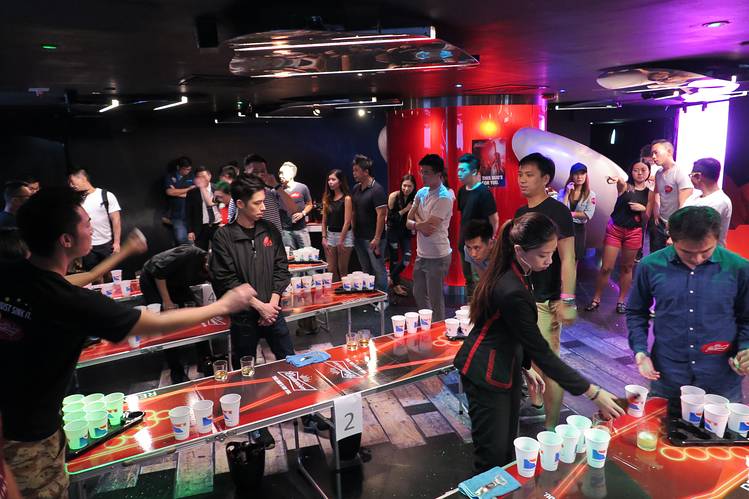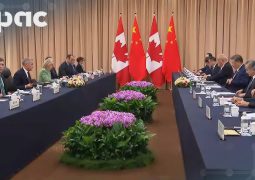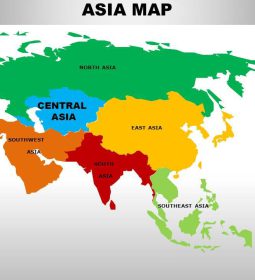Beer Pong in Hong Kong Has Its Own Kooky Rules—and Purists Hate Them

HONG KONG—Marc Simmons loves beer pong but hates playing beer pong in Hong Kong.
Most bars here force customers to play the Hong Kong version of the game—known as the “double cherry” rules.
“The rules are stupid. Period,” says Mr. Simmons. The 26-year-old, who attended college at both Georgetown and American University, started playing the drinking game using the traditional rules in high school in New York. “The double cherry requires absolutely zero skills,” he says.
Beer pong has been a staple of American teenagers’ parties for years. Although rules vary from table to table, the core of the game is simple: toss a ping-pong ball from one side of the table into an opponent’s cup, which forces your opponent to drink its contents.
Traditional rules were codified a decade ago by BPONG. The American organization elevated the game’s profile by putting on the annual World Series of Beer Pong, lately in Las Vegas, the world’s biggest beer-pong tournament. Last year about 600 people participated, paying $1,000 per team of two for the weekend at a hotel, and the winner took home a $50,000 prize.
Under the world series rules, known as WSOBP, players must “eliminate” all 10 cups arranged in a triangle by tossing a ball into each, with two throws per turn. (At tournaments, cups are filled with water, and while plenty of drinking goes on, the forced drinking aspect of the game is removed.)
A lengthy list of rules governing everything from cup size, 3 5/8 inches wide at the rim and 2¼ inches wide at the base, to what kinds of distractions are permitted can be found on the BPONG website.
Billy Gaines, the founder of BPONG, stripped out some of the convoluted rules rewarding trick shots likely developed over hours of drinking in frat house basements, such as “NBA jam—on fire” (if a player is sinking consecutive shots he can try to continue); “death cup” (throwing into a cup that has already been scored, which ends the game); and “island cup” (hitting a lone cup not touching a cluster of other cups). His goal was to make the game more about skill than luck—although he retained the “dipshit not paying attention rule.”
“Our rules come down to the bare basic principle of who is more skillful in hitting the cup,” Mr. Gaines says. “Everyone gets a chance to shoot. If your team is shooting a high percentage of the shots, you will probably win the game.”
Hong Kong bar owners realized it would be more profitable if beer-pong games were quicker—more games meant more beer sold—and less about skill—so newbies felt they had a chance to win.
They started tinkering with the rules. The biggest innovation: the double-cherry rule, in which six of the 10 cups are eliminated—speeding up the game—if you are able to hit the front cup twice on your first turn. In some bars, hitting the double cherry could even end the game on the first turn.
“Double cherry is like a hat trick,” says Michael Chan, who was once hired by Danish brewer Carlsberg to be a beer-pong coach in Hong Kong. He suggests people who aren’t “good enough” to accomplish it should “go home and practice.”
Mr. Chan, along with Kevin Tam, founded Beer Kong, which promotes beer pong in Hong Kong. They were among the early promoters of the double-cherry rules, and they organized a double-cherry tournament in 2014 with a prize of more than US$3,000—Hong Kong’s biggest tournament payout.
Other changes for Hong Kong play included “first blood,” where players were rewarded with the elimination of three cups when they scored one ball into the front cup on their first turn; “ball in combo,” three cups eliminated when they scored two balls into two different cups during the same turn; and “single cherry,” four cups eliminated when they scored two balls into the same cup during the same turn—other than the front cup on the first turn.
To Michael Popielarski and other traditional-rule loyalists, the changes were puzzling. “First blood is the oddest to me because it is the easiest cup to hit. So to get awarded for three cups is a lot,” says the three-time WSOBP champion.
“You need agility, mental and physical endurance to hit every cup” under the traditional, WSOBP rules, says Kenneth Tso, Hong Kong’s longtime No. 1 player. “These new kids aren’t training properly, so their skill sets would never be taken seriously outside of Hong Kong.”
His brother, Kirin Tso, who founded the Hong Kong Beer Pong Association, puts the blame on businesses. “Money-hungry companies are ruining the essence of the game,” he says.
A local startup, Atalon Ventures (International) Ltd., incorporated the new-style rules into a digital beer-pong table it developed in 2015 called PongCONNECT. The table features cup-detecting pods and LED lights that turn into fancy animations when one of the motion-sensored balls goes into a cup. Players can track game statistics through a link with a data-analysis app.
Ronald Chiu, Atalon’s president, says he played under the traditional rules while a student at the University of Southern California, but he felt the double-cherry rules could turn beer pong from a party game into a commercialized activity.
He says more than 60 bars in Hong Kong now have PongCONNECT tables and 50,000 games are played each month. He says his goal is to rent out 2,500 tables by the end of this year in Hong Kong, Japan, Malaysia and Taiwan.
He is also gearing up for a U.S. expansion. A new version of PongCONNECT is expected this month with a “classic” mode, using WSOBP rules. Messrs. Gaines and Popielarski are expected to travel to Hong Kong for the launch.
“Markets want a product that is globally viable,” the businessman says.
- Previous Islamic State Video Threatens China With Homegrown Fighters Video appears to show recruits from China’s mostly Muslim Uighur minority threatening to ‘avenge oppression’
- Next Police Confiscate Passports in Parts of Xinjiang, in Western China
















